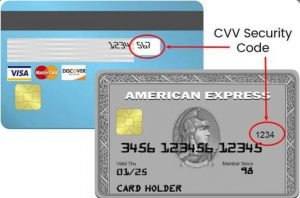WHAT ONLINE STORES DON’T REQUIRE CVV
Are you interested in knowing what online stores don’t require cvv? If so, then you are on the right page. Feel relaxed and make sure you read the article to the end.

Here are the online stores which don’t require CVV:
The most prolific store that doesn’t require a CVV is Amazon.
Plenty of other major online stores like Walmart and Target will often forgo asking for a CVV when you check out.
More generally, any online store can skip CVV confirmation whenever they want to, and there are plenty of scenarios where that makes sense.
So if you want to learn all about what CVV is and why and which online stores don’t require it, then this article is for you.
What is a CVV code on a debit or credit card?
If you’ve ever noticed a three- or four-digit number on your credit card, you’ve found the CVV code. An acronym for Card Verification Value, a CVV or SPC code is a security feature that helps to prevent identity theft, scams, and credit card fraud.
Where is the CVV code located, and how can you find it? The answer depends upon the type of card you have, because each major credit card uses a different format for its code.
CVV codes for different credit cards
For VISA, Mastercard, and Discover, the standard CVV number is a three-digit number that’s printed next to the white signature panel on the back of the card. On American Express cards, the CVV is a four-digit code that’s printed on the front of your card, above your account number on the right side.
Each credit card has two CVV codes, the one that’s printed on your card (and used for in-person purchases), and one that’s encoded within the magnetic strip of your card and used for card-not-present purchases.
CVV codes are also referred to by different acronyms, according to the credit card company. Here they are at a glance:
*VISA: CVV2
*Mastercard: CVC2
*Discover: CID (Card Identification Number)
*American Express: CID
*Debit cards: CSC (Card Security Code)
How Does CVV Work?
CVV means “Card Verification Value”. It is a 4-digit number that is commonly seen on the back of a credit card. It’s a secure number, also important for any transaction. Card Holder shouldn’t share the CVV with anyone. This special number has been established by the Credit Card authority to prevent fraudulent internet transactions. 3 or 4-digit CVV code that provides a cryptographic check for the credit card. CVV is just a security check code that identifies a real owner. It shows the customer who placed an order for the shop online is the original owner and he is using this card properly. Also transferring money with card number and CVV.
If someone only lifted the card number and doesn’t have access to the CVV, then they won’t be able to make fraudulent purchases.
That’s the gist of why CVVs exist, but it leads to something important.
Not all digital stores require a CVV.
Which Online Stores Don’t Require CVV? (3 Categories)
It might seem strange, but there are a number of prominent digital retailers that don’t use the CVV at all.
There are even more than only sometimes using the CVV.
Stores opting out of using the CVV
The best-known is Amazon.
You can make Amazon purchases without putting in your CVV, and you still get your package.
Walmart, Target, Overstock, Zappos, and plenty of other major online retailers also fit into this category.
You can see a pretty substantial list here.
Now, there are two things we should really get into.
First, some of these stores will require a CVV for some purchases and not others.
Stores can set price thresholds before the system will ask for a CVV.
There are also cases where stores will stop asking for a CVV after you have already completed a purchase.
Second, you will find that CVV numbers simply aren’t applicable in a lot of online transactions.
So, let’s get into some of the common scenarios where a CVV won’t be used and why.
You’ll see that pretty much any online store could fall into some of these categories in at least some instances.
1. Stores With Saved Credit Card Information
A lot of stores offer to save your financial information.
The assumption is that you will make another purchase in the future.
So, if you save your info, it makes your next purchase that much easier.
Even when this is the case, stores vary in what they do.
Some will ask you to confirm the CVV every time, and others won’t.
For the stores that don’t repeatedly ask for your CVV, here’s the motivation.
If you make a purchase, it gets delivered, and there is no complaint or report of fraud with your card, the store can assume that it was a legitimate purchase.
Moving forward, unless you change the financial or shipping information, the store can continue to assume that you are the rightful owner of the card, so the CVV confirmation isn’t necessary anymore.
2. Stores With Alternate Payments
On a completely different note, there are a lot of stores that accept payments that don’t attach to credit or debit cards.
The easiest example is PayPal.
If you have a PayPal account set up, many, many online stores will accept payments from PayPal.
When that happens, you don’t even put in a credit card number.
Instead, you choose PayPal as your method of payment, and the PayPal system kicks into gear.
It might ask you to sign in or go through a digital verification process, but it still doesn’t need you to enter the card info.
Naturally, if you aren’t using a credit card for the purchase, it makes sense that you don’t need to supply a CVV.
3. Stores That Accept Payment Management
There’s a third scenario that exists somewhere in between these other payment concepts.
There are payment management systems that will store your credit (or debit) card information for you.
Two prominent examples are Apple Pay and Google Wallet.
If you use a system like this, then when you go to make your purchase, you are ultimately paying with a card on file.
But, the payment manager works a lot like PayPal in the previous example.
The management system handles verification and processing, so the online retailer doesn’t actually get your direct credit card information.
Is It Illegal to Ask for The CVV Code When Shopping Online?
No, It’s not. CVV is a security code check. Its main purpose is payment processing through Credit and Debit cards online. Online shop portals have no permission to save your card information such as Card number, CVV, or PIN as it is against Data Security Standards policy. CVV number is also used in Card Not Present transactions. It’s a payment system that is mostly used Online or Phone.
You should give the CVV code to a trusted online shop. Sometimes online merchants don’t ask for a CVV number. They get your order without CVV and deliver you on time. But surely, CVV helps to ensure payment from legitimate card holders. However, if you are asked by someone who calls you to verify the card, just refuse to give it. Because, it’s a scam call, just to steal your card information to mislead.
10 Stores to Shop Online With Credit Card Number Only No CVV
1. Amazon
2. Express
3. Lacoste
4. Target
5. Walmart
6. L.L.Bean
7. Zappos
8. Sierra
9. Overstock
10. Flipkart
How Can I Bypass CVV Code?
It’s a technical question about how to bypass CVV code for shopping. But, legally it is not possible to except from certain online shops. Let me explain. For example, Amazon is a well-known shopping website that generally uses credit cards with CVV. But, if you make payment with Amazon Pay, you don’t require the CVV code. Apart from it, you can go for an online retailer that doesn’t need CVV. You may find some retailers and can shop online with credit card number only no CVV is required for this.
READ ALSO:BANK OF INDUSTRY
Can You Use Only Credit Cards Without a CVV Number?
Technically it is possible to shop online with credit card number only. Think of Zappos. When you swipe your credit card at the counter, they hardly ask for a CVV code. Also, Amazon requires CVV for the first time of purchase. Next time you won’t need to enter it. Another merchant service “WorldPay”, refuses to accept CVV. You can complete shopping on those sites without even using CVV.








